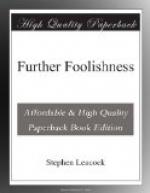“But I don’t understand!” I said. “Why were you in Toronto?”
“Perfectly simple. Special military service. We were there to make a report. Each day we kept a record of the velocity and direction of the wind, the humidity of the air, the distance across King Street and the height of the C.P.R. Building. All this we wired to Germany every day.”
“For what purpose?” I asked.
“Pardon me!” said the General, and then, turning the subject with exquisite tact: “Do you remember Max?” he said.
“Do you mean the tall melancholy looking waiter, who used to eat the spare oysters and drink up what was left in the glasses, behind the screen?”
“Ha!” exclaimed my friend. “But why did he drink them? Why? Do you know that that man—his real name is not Max but Ernst Niedelfein—is one of the greatest chemists in Germany? Do you realise that he was making a report to our War Office on the percentage of alcohol obtainable in Toronto after closing time?”
“And Karl?” I asked.
“Karl was a topographist in the service of his High Serenity the King Regnant of Bavaria”—here my friend saluted himself with both hands and blinked his eyes four times—“He made maps of all the breweries of Canada. We know now to a bottle how many German soldiers could be used in invading Canada without danger of death from drought.”
“How many was it?” I asked.
Boobenstein shook his head.
“Very disappointing,” he said. “In fact your country is not yet ripe for German occupation. Our experts say that the invasion of Canada is an impossibility unless we use Milwaukee as a base—But step into my motor,” said the Count, interrupting himself, “and come along with me. Stop, you are cold. This morning air is very keen. Take this,” he added, picking off the fur cap from the chauffeur’s head. “It will be better than that hat you are wearing—or, here, wait a moment—”
As he spoke, the Count unwound a woollen muffler from the chauffeur’s neck, and placed it round mine.
“Now then,” he added, “this sheepskin coat—”
“My dear Count,” I protested.
“Not a bit, not a bit,” he cried, as he pulled off the chauffeur’s coat and shoved me into it. His face beamed with true German generosity.
“Now,” he said as we settled back into the motor and started along the road, “I am entirely at your service. Try one of these cigars! Got it alight? Right! You notice, no doubt, the exquisite flavour. It is a Tannhauser. Our chemists are making these cigars now out of the refuse of the tanneries and glue factories.”
I sighed involuntarily. Imagine trying to “blockade” a people who could make cigars out of refuse; imagine trying to get near them at all!
“Strong, aren’t they?” said von Boobenstein, blowing a big puff of smoke. “In fact, it is these cigars that have given rise to the legend (a pure fiction, I need hardly say) that our armies are using asphyxiating gas. The truth is they are merely smoking German-made tobacco in their trenches.”




